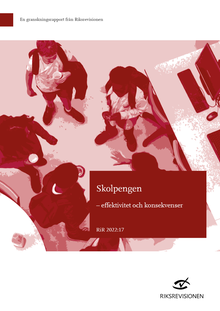A standard rate for school vouchers should be introduced
The school voucher system was introduced in connection with the school choice reform, and has been important for pupils to be able to make a school choice. The Swedish National Audit Office’s audit shows that the system has some disadvantages, and that the Government should ensure the introduction of a nationally determined standard rate for compensation to independent schools.

Photo: Caiaimage
The Swedish National Audit Office (Swedish NAO) has audited the regulatory framework for school vouchers. The overall assessment is that it entails a number of unwanted consequences and should therefore be amended.
The main problem is the ‘equal terms principle’, which stipulates that compensation to independent schools must be determined according to the same principles that the municipality uses for its own school activities. Therefore, if costs for municipal schools increase, the school voucher will increase, regardless of whether or not the independent schools’ costs have increased.
Municipal and independent school authorities both have a responsibility to provide their pupils with a good education. However, a municipality is also obliged to provide a place for all pupils who wish to attend a municipal school, and needs to be prepared to receive additional pupils on short notice. Therefore, a municipality also cannot decide the exact size of its school, but is obliged to adapt to the existing student base. An independent school can decide a maximum number of students and decline any students beyond that amount.
Municipalities’ greater responsibility in practice means that municipal compulsory schools often operate with fewer or more pupils in each class than is most beneficial from a financial or educational perspective.
When a pupil switches schools, they bring their school voucher with them, while a large portion of the costs remain. This makes it difficult for some schools, both municipal and independent, to plan their activities.
“Our interviews show that schools with an uncertain student base become more inclined to employ staff on temporary contracts. They also tend to employ less experienced staff or reduce the scope of work for the support staff. This can lead to worsened continuity and stability for pupils in need of support,” says Sofia Sandgren Massih, Project Leader for the audit.
The regulations also lead to other difficulties for independent schools. The audit shows that municipalities’ decisions on the size of the school voucher are sometimes delayed, are often unclear and do not meet the requirements of the Schools Ordinance.
“A nationally determined standard rate for school vouchers for independent schools would help streamline the system and also improve independent schools’ ability to make plans,” says Auditor General Helena Lindberg.
The audit also shows that the Swedish Schools Inspectorate seldom assesses that the establishment of new independent schools will lead to significant negative effects in the long term. The Swedish Schools Inspectorate interprets the law narrowly based on the two examples provided in the underlying Government Bill. According to the Swedish NAO’s assessment, this way of looking at the problem is too limited.
Recommendations in brief
The Swedish National Audit Office recommends that the Government ensure that a nationally determined standard rate is used to compensate independent school authorities. Such a standard rate should allow some variations based on factors such as population density, teacher salary levels and costs for premises.
If the Government chooses not to follow the recommendation, the Swedish NAO proposes that the Government ensure that a standard rate for compensation for the costs of premises to independent schools is introduced.
The National Agency for Education is recommended to produce a national template for reporting of municipalities’ school funding decisions to independent school authorities.
The Swedish Schools Inspectorate is recommended, among others, to ensure that the government agency has sufficient input regarding significant negative effects in the long term to be able to make an overall assessment.
See the report for full recommendations.
Press contact: Olle Castelius, phone: +46 8-5171 40 04.
Presskontakt: Olle Castelius , telefon: 08-5171 42 06.
Share in social media and by e-mail
Contact form
Send your questions or comments via the form below and we will make sure that they reach the right member of staff. Please state if your question concerns the information on this particular page.


